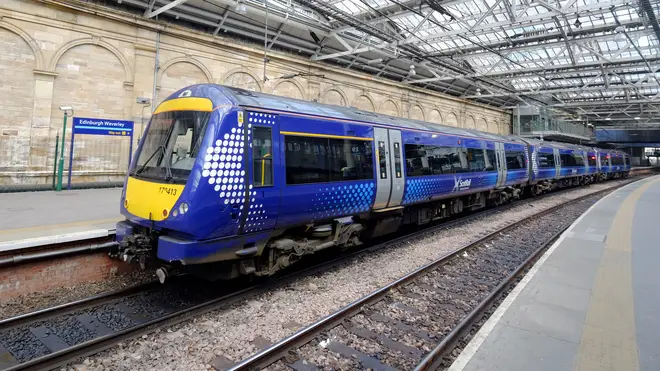
Nick Ferrari 7am - 10am
31 December 2021, 13:54

At least eight operators have either already reduced frequencies on many routes or will do so in the coming days.
Hundreds of daily trains are being removed from timetables in an attempt to improve reliability following weeks of short notice cancellations.
At least eight operators have either already reduced frequencies on many routes or will do so in the coming days in response to pandemic-related staff shortages.
Passengers travelling on New Year’s Eve also face major disruption due to industrial action.
⚠ SEVERELY AMENDED SERVICE ⚠
We're sorry, but due to strike action by members of the RMT union, we are running an extremely limited service today.
Your original train may not be running.
For timetables, alternative travel arrangements, refunds:- https://t.co/Pkb9Mtp3JK pic.twitter.com/R1WreXsC1g
— CrossCountry trains (@CrossCountryUK) December 31, 2021
The Rail, Maritime and Transport (RMT) union said a 24-hour strike by its members employed by CrossCountry was “solidly supported”, causing the majority of the operator’s services to be cancelled.
In recent weeks rail firms across Britain have axed trains at short notice due to staff self-isolating or unwell.
Many have responded by releasing condensed timetables in a bid to create more certainty about which services they can and cannot operate.
I'm aware of disruption to some rail services as a result of staff shortages. While it is for operators to manage timetables, I continue to monitor the situation closely.
Remember to always check the status of your service before travel 🚆 ✔️
— Wendy Morton MP (@morton_wendy) December 30, 2021
Rail minister Wendy Morton said: “While it is for operators to manage timetables, I continue to monitor the situation closely.”
A spokesman for industry body the Rail Delivery Group said operators are “working hard to provide a reliable train service” amid reduced staff numbers.
He continued: “Some rail companies are introducing amended timetables owing to much less demand for train services.
“This could mean short-notice cancellations and changes for customers, so our advice to anyone travelling is to check online before they set out or to sign up for automatic alerts from National Rail Alert Me.”
Anthony Smith, chief executive of watchdog Transport Focus, told the PA news agency: “This is a pragmatic response to rising staff illness. But services must meet the needs of those who still have to travel, especially key sector workers.
“These include protecting first and last services, providing enough capacity to keep passengers at a safe distance from each other and making the new timetable reliable and the information accurate.”
ScotRail said it will introduce a temporary week-day timetable from Tuesday until January 28 as the Omicron variant has resulted in a “large number of absences”.
More than 150 daily services will be cut, including on routes such as Glasgow to Edinburgh via Airdrie/Bathgate; Glasgow Central to Lanark; Edinburgh to North Berwick; and Edinburgh to Tweedbank.
In light of the impact of the Omicron variant on staff numbers, we are introducing a new timetable on Monday 17 January.
Until then, our services are subject to short term alterations. Please check before your travel.
More information is available here: https://t.co/rH0tdMukAb
— SWR Help (@SW_Help) December 30, 2021
SWR announced it will operate a new timetable from January 17 as the Omicron variant has had a “significant impact on our services”.
The operator said in a statement: “Our focus is on producing a timetable that is deliverable so that we improve reliability for our customers, and caters to key workers, school pupils and those who cannot work from home.”
It has not revealed which services are being cut.
Greater Anglia announced it will not operate approximately 70 week day services next week due to a combination of “falling passenger numbers” and staff shortages.
This will affect routes such as Norwich to London Liverpool Street; Colchester to Ipswich; Cambridge to Ipswich; and Norwich to Great Yarmouth.
Southern announced on Thursday it will not serve London Victoria – one of the UK’s busiest stations – until January 10 due to “coronavirus isolation and sickness”.
Great Northern, Thameslink and Hull Trains have also unveiled reduced timetables.
CrossCountry has removed around 50 trains from its timetables between Mondays and Saturdays from December 27 until January 8.
The industrial action affecting the firm on New Year’s Eve involves train managers and senior conductors in a row over the role of guards.
CrossCountry said passengers were “strongly advised to alter their plans and avoid travel”.
It is not operating any trains between these locations: Aberdeen and Edinburgh; Glasgow Central and Edinburgh; Derby and Nottingham; Peterborough and Stansted; Cheltenham Spa and Cardiff Central; Newton Abbot and Paignton; and Plymouth and Penzance.
A “heavily reduced service” is in place between Edinburgh and Plymouth; Manchester Piccadilly and Bournemouth; and Birmingham New Street and Peterborough.